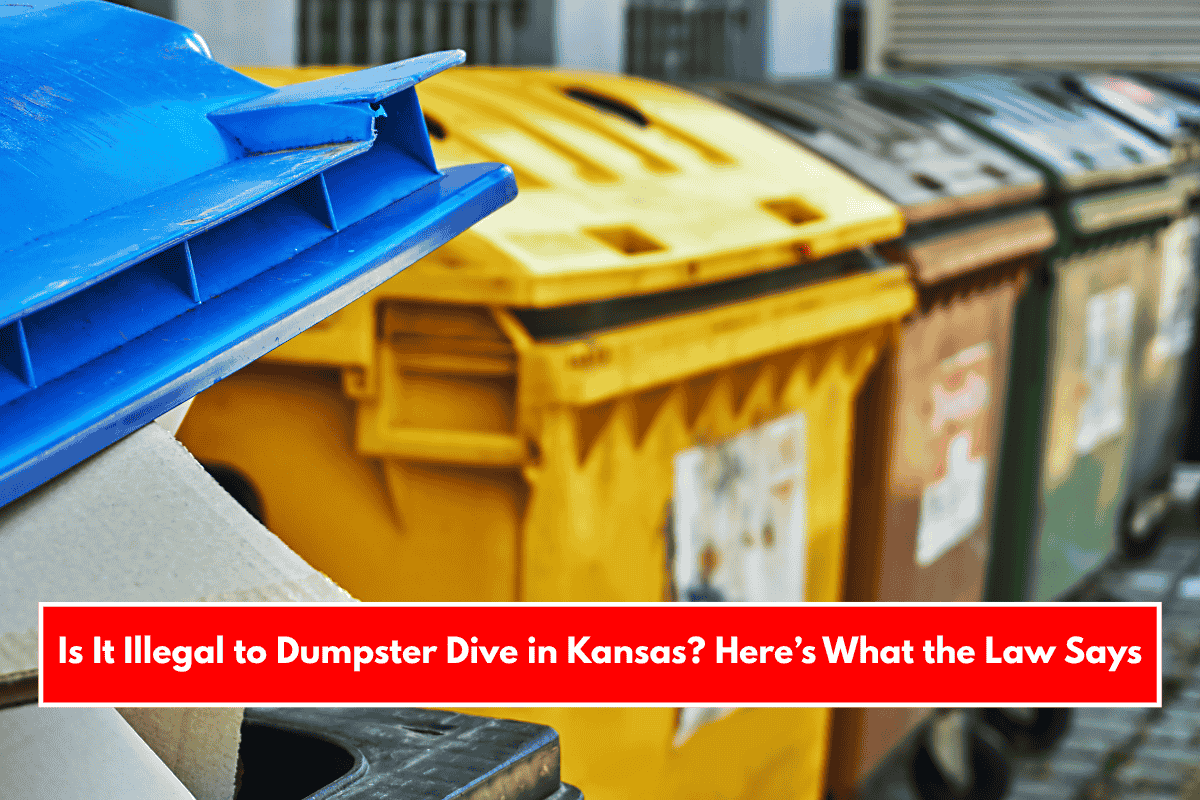Dumpster diving-the act of searching through commercial or residential trash for useful or valuable items-has grown in popularity as a means of saving money, reducing waste, and even supporting sustainable living. But is it legal in Kansas? The answer is nuanced, depending on property rights, local ordinances, and how the activity is conducted.
General Legal Status in Kansas
- No Statewide Ban: There is no law in Kansas that explicitly prohibits dumpster diving statewide. Once items are discarded, the original owner generally relinquishes ownership, and the contents of a dumpster are often considered abandoned property.
- Federal Precedent: The 1988 Supreme Court case California v. Greenwood established that there is no reasonable expectation of privacy for trash left for collection in a public space, making dumpster diving technically legal under federal law.
- Local Ordinances Matter: While Kansas does not have a statewide prohibition, cities and counties can enact their own rules. Some municipalities may have ordinances that restrict or ban dumpster diving, so it’s essential to check local regulations before diving in.
Key Legal Concerns
1. Trespassing
- Private Property: Most dumpsters are located on private property-behind stores, in apartment complexes, or within fenced enclosures. Entering private property without permission to access a dumpster is trespassing, which is illegal and can result in citations or arrest.
- Signage: If a dumpster is marked with “No Trespassing” or “No Dumping” signs, or is locked or fenced in, it is off-limits. Ignoring these warnings can lead to legal trouble.
2. Theft
- Abandoned Property: Once trash is discarded, it typically becomes the property of the waste management company or is considered abandoned. However, if you take items before they are officially discarded or from a locked or secured area, you could be accused of theft.
- Recyclables: In some areas, taking recyclables for resale can be considered theft, especially if the city or waste company claims ownership of those materials.
3. Disorderly Conduct and Littering
- Leaving a Mess: Even if dumpster diving is otherwise legal, making a mess, blocking traffic, or causing disturbances can result in fines for disorderly conduct or littering.
- Vehicle Use: Using a vehicle to collect large quantities of items may draw suspicion and could be mistaken for theft by bystanders or business owners, potentially leading to police involvement.
Liability and Safety Issues
- Injury: If you are injured while dumpster diving, you generally assume the risk. However, some property owners enforce strict no-diving policies to avoid potential lawsuits.
- Food Safety: Consuming food from dumpsters carries health risks, and businesses may be concerned about liability if someone gets sick from discarded food.
Practical Tips for Dumpster Diving Legally in Kansas
- Check Local Laws: Always research city or county ordinances regarding dumpster diving.
- Respect Private Property: Do not enter fenced, locked, or clearly marked private areas without permission.
- Look for Signs: Avoid dumpsters with “No Trespassing” or similar signage.
- Be Discreet and Clean: Leave the area tidy and avoid drawing unnecessary attention.
- Ask for Permission: When in doubt, seek permission from the property owner or manager.
Dumpster Diving Legality in Kansas
| Aspect | Legal Status in Kansas |
|---|---|
| Statewide Ban | None; dumpster diving not illegal statewide |
| Private Property | Illegal without permission; risk of trespassing |
| Signage/Locks | Illegal if signs posted or dumpster is locked |
| Public Property | Generally legal, unless local ordinances prohibit |
| Local Ordinances | Vary by city/county; always check first |
Dumpster diving in Kansas is not illegal at the state level, but the activity is heavily regulated by property rights and local ordinances. The primary legal risks are trespassing and violating posted restrictions. To stay on the right side of the law, always respect private property, heed posted signs, and check local regulations before diving in. When in doubt, ask for permission or consult local authorities to avoid potential legal trouble
Sources:
- https://www.reddit.com/r/DumpsterDiving/comments/159ul08/in_kansas_is_this_legal/
- https://en.wikipedia.org/wiki/Dumpster_diving
- https://www.answers.com/law/What_are_the_laws_for_dumpster_diving_in_Kansas
- https://www.rolloffdumpsterdirect.com/dumpster-diving-illegal/
- https://www.findlaw.com/injury/torts-and-personal-injuries/dumpster-diving.html














